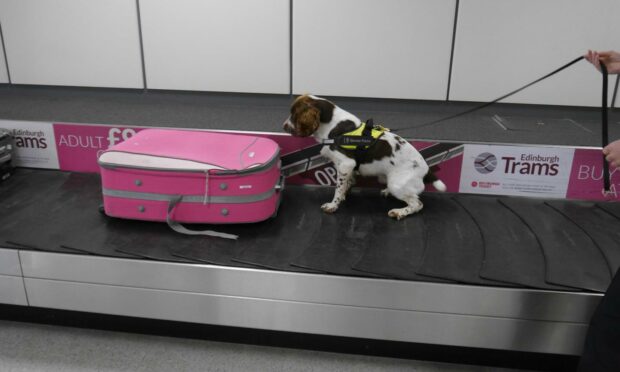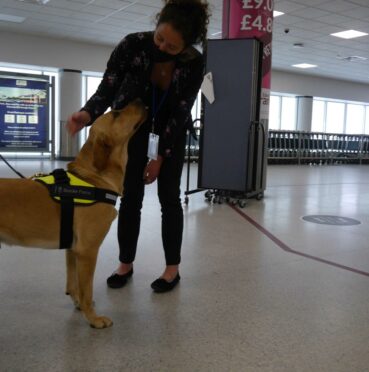Specially-trained detector dogs are to be stationed in Scotland’s airports and postal hubs in a bid to stop the spread of exotic animal diseases.
The Scottish Government is funding the dogs and their handlers, who will work to sniff out ‘products of animal origin’, such as meat and meat products, from entering Scotland.
It is hoped this will stop the spread of animal diseases such as African swine fever or foot and mouth disease.
Rural Affairs Secretary Mairi Gougeon is also reminding people not to bring any meat products when they come back to Scotland after being away over the festive period.
Helping to keep rural economy safe
The dogs and their handlers will now be stationed in airports, ports and postal hubs across the country.
Figures from Border Force North show in 2020 more than a tonne of products of animal origin were seized at ports and airports in Scotland.
Ms Gougeon said: “The Scottish Government and Border Force have worked closely to get the dogs operational in Scotland.
“Alongside their handlers, they have taken part in a robust training regime and now that they have passed their assessments they can get to work and help us detect products of animal origin entering Scotland illegally.
“The Scottish Government investment in our new detector dog service will enhance the detection of illegal products of animal origin and reduce the risk of exotic diseases entering Scotland, thus helping to keep our rural economy safe.”
She adds monthly data provided to the government by Border Force North will help monitor where these products are coming from, and if there are any periods where the number of seizures are above average.
A new dog squad has been specially trained to sniff out products of animal origin (PoAO) and prevent them from entering circulation in Scotland.
Read more: https://t.co/Y3sCQVFh2c @MairiGougeon pic.twitter.com/8ReYAaOqNE
— ScotGov Rural (@ScotGovRural) January 2, 2022
Ms Gougeon added: “We work closely with colleges and universities to ensure that international students studying in Scotland are aware of rules regarding the import of products of animal origin.
“It’s important for people to remember when travelling, particularly during the festive period, that they should not bring any meat or meat products with them when returning to the UK as they could carry diseases such as African swine fever.
“It is vital to keep the UK’s pig sector safe and free from this devastating disease.”
Over a tonne could be seized each year
African swine fever is spread through importing pork and pork products, and it can be deadly in pigs.
The disease does not however affect humans.
Marie Craig, assistant director for Border Force Scotland, added: “Border Force detector dogs protect the UK from over a tonne of potentially harmful products that could spread disease each year.
“The deployment of specially trained detector dogs across our ports in Scotland will further improve our ability to protect the public from the importation of exotic diseases.”
Farming in 2021: a look back at the record-breaking livestock of the year

